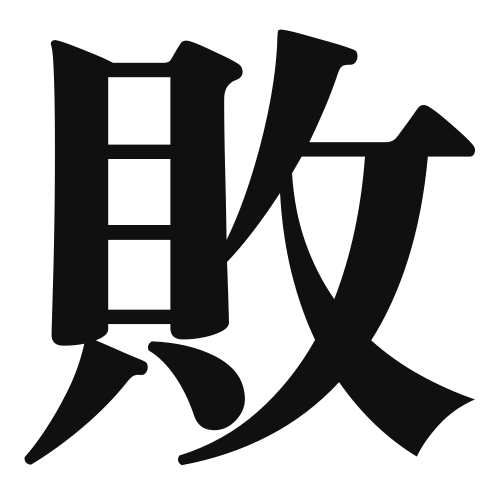1. Overview of Meaning
The kanji “敗” (pronounced “hai”) means “defeat” or “failure.” It is often used to describe a loss in a competition or a setback in achieving a goal.
2. Formation and Radical
The kanji “敗” is a compound character that combines elements to convey its meaning. It consists of the radical “衣” (clothing) and the phonetic component “敗” (which suggests the sound). The character can be understood as a representation of something being “torn” or “broken,” symbolizing defeat.
The radical “衣” relates to clothing, which can metaphorically represent the idea of being stripped of one’s dignity or status in the face of defeat.
3. Examples of Usage
Common words and phrases that include “敗” are:
- 敗北 (はいぼく, haiboku) – defeat
- 敗者 (はいしゃ, haisha) – loser
Example sentences in daily conversation:
- 私たちは試合で敗北しました。 (Watashitachi wa shiai de haiboku shimashita.) – We were defeated in the match.
- 敗者は次のチャンスを待つべきです。 (Haisha wa tsugi no chansu o matsu beki desu.) – The loser should wait for the next opportunity.
4. Synonyms and Antonyms
Similar kanji with related meanings include:
- 失敗 (しっぱい, shippai) – failure (more general, can refer to mistakes)
Antonyms include:
- 勝利 (しょうり, shouri) – victory
5. Cultural and Historical Background
The concept of “敗” is significant in Japanese culture, particularly in the context of sports and competitions, where the spirit of sportsmanship emphasizes respect for both winners and losers.
Proverbs and idiomatic expressions that include “敗” are:
- 敗者復活 (はいしゃふっかつ, haisha fukkatsu) – “the revival of the defeated,” referring to the idea of making a comeback after a loss.
